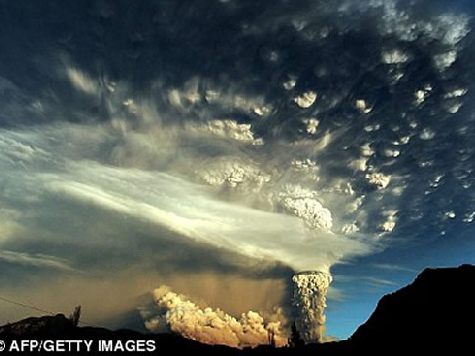Could erupting volcanoes be slowing down global warming? A new report suggests that 17 eruptions between 1998 and 2012 spewed enough sulfur into the upper atmosphere to create a mirror-like condition, which reflects the sun’s heat away from the earth’s surface.
Over the last two decades, the earth has seen a dramatic halt in any type of global warming activity. This status quo development has undermined the Intergovernmental Panel on Climate Change’s (IPCC) computer models, which predict non-stop continued warming for the planet attributable to human activity.
The IPCC models assumed that volcanic aerosols would fall to the ground and not remain in the atmosphere, which created the reflective phenomenon. Benjamin D. Santer, a climate scientist at Lawrence Livermore National Laboratory, was the lead author of the volcanic aerosol study. Santer’s research focuses on climate model evaluation, the use of statistical methods in climate science, and the detection and attribution of natural and anthropogenic “fingerprints” in observed climate records. Dr. Santer’s history includes work involving the “discernible human influence” conclusion of the 1995 Report by the IPCC. He states that the new study shows that, “Effectively, the real world has experienced a partial cooling effect associated with this uptick in volcanic activity.”
Since global warming models hit a snag at the turn of the century, and the planet stopped warming, climatologists have been scratching their heads and looking for answers as to what went wrong with their predictive algorithms. Last year, a Nature study suggested that it was Pacific Ocean oscillations that was drawing heat away from land surfaces and creating a cooling effect on the planet. According to Santer, that may be partly responsible for the global warming hiatus.
Now he says there is more to it:
When you get a big volcano that injects sulfur dioxide into the stratosphere, into the upper atmosphere, that sulfur dioxide forms these liquid phase sulfuric acid droplets, those reflect incoming sunlight back to space, they cool the lower atmosphere and surface, and when they cool the ocean surface, the recovery takes years.
Piers Foster, a climate scientist at the University of Leeds, one of the principal authors of the 2007 United Nations Intergovernmental Panel on Climate Change, implies that the science is settled and assures us that “Volcanoes give us only a temporary respite from the relentless warming pressure of continued increases in CO2.” Santer adds, “It’s a fascinating detective story; volcanoes are part of that detective story.” The global warming scientist says defensively, “It’s not like we’re whistling around in the dark trying frantically to come up with ever more implausible explanations for what happened, who done it.”

COMMENTS
Please let us know if you're having issues with commenting.